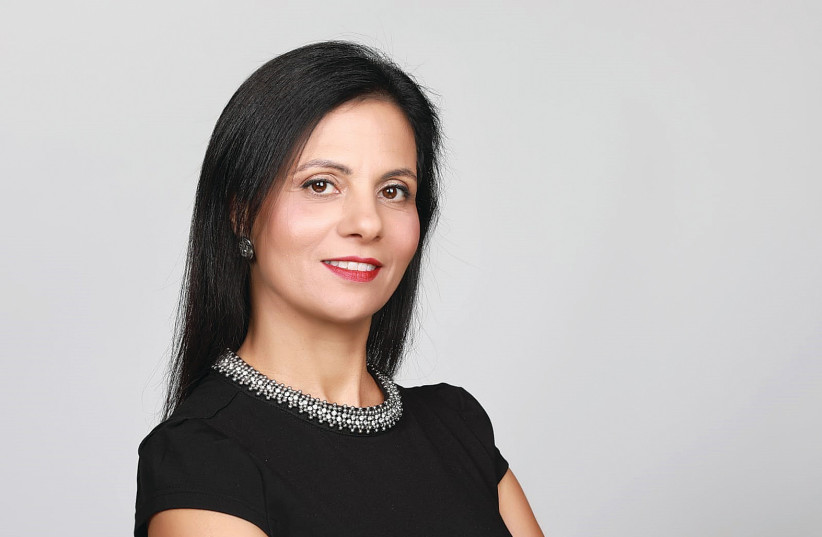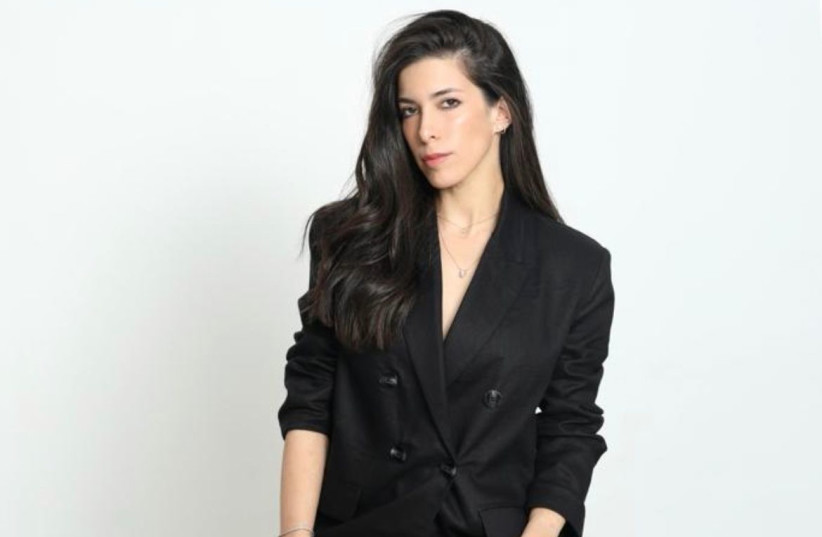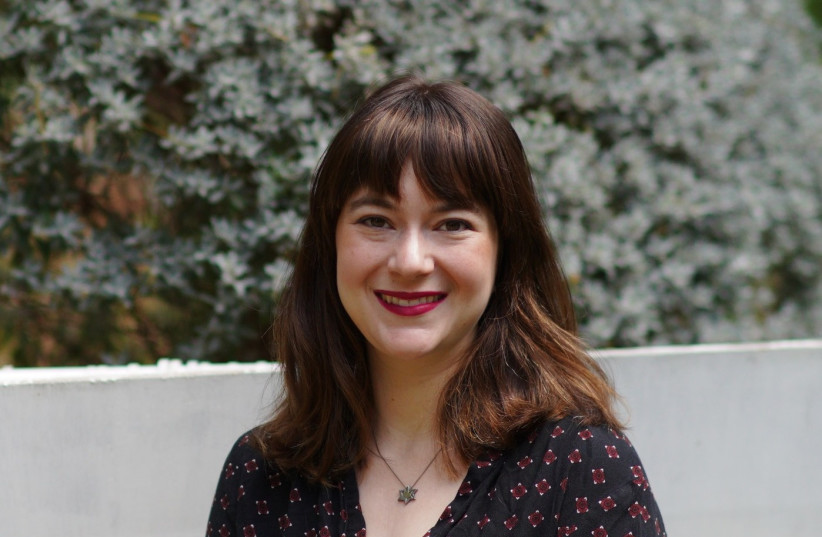In one of the most jarring videos that have emerged from the current war, the 22-year-old German-Israeli Shani Louk is seen partially naked as she is paraded in the streets of Gaza City by Hamas terrorists in the back of a pickup truck. Her long, black tresses are covered in blood from a significant head injury she sustained, presumably while trying to flee from her captors who raided the Supernova music festival she had participated in on the fateful, dark morning of October 7.
In the video, Gazans can be seen running after the truck in cheers, repeating the “Allahu akbar” cries chanted by the terrorists; they surround the vehicle, and then some of them spit on Louk’s body.
Only on October 30 were the Israeli and German governments able to confirm Louk’s death, relying on the fact that a temporal bone from her skull was found at the Supernova festival site with her DNA. A dislodgement of this bone is indicative of death, as no person can live without it. The rest of Louk’s body has never been recovered.
Louk’s tragic death, which involved the humiliating parade that was recorded in the video spread by the terrorists, is unfortunately only one of numerous testimonies that indicate that, aside from the murder and kidnapping of civilians and soldiers, Hamas had made the rape, assault, violation, and humiliation of women a prime goal in its attack on Israel last month.
While thousands of pieces of evidence have been collected by Israeli authorities, including personal testimonies and a document proving that Hamas terrorists were trained and taught to order women to take their pants off in Hebrew, there are those abroad who have denied this phenomenon. Denial is not the only harrowing response to what emerges as a systematic plan by Hamas to sexually attack Israeli women. Even louder than the denial is the deafening silence of leading women’s movements and human rights organizations, such as the group UN Women – the UN’s entity working for gender equality and the empowerment of women.

On Wednesday, the UN’s ongoing silence in the face of such methodical violence against women was called to question by Permanent Representative of Israel to the United Nations Gilad Erdan. Speaking at a UN Security Council meeting, Erdan hoisted up a picture of the 19-year-old Naama Levy, a soldier who had been kidnapped to Gaza. The photo shows Levy getting dragged out of a jeep by Hamas terrorists; her back is turned to the camera, revealing a large bloodstain that covers her backside and spreads down her legs, soaking her pants.
A project of historical significance
Following the UN meeting, Channel 12’s US correspondent Yuna Leibzon reported that UN representatives have finally held their first meeting with members of the Civil Commission on October 7 Crimes by Hamas Against Women, founded by the Hebrew University’s Dr. Cochav Elkayam-Levy.
For the past 25 years Prof. Yifat Bitton, a member of the commission, a legal expert and the president of Achva Academic College, has been researching violence against women and turning sexual assaults and murders into lawsuits to compensate victims.
“What’s important in our project of gathering evidence is not only for us to be able to prove that it happened, although of course that matters, too,” she explains in conversation with The Jerusalem Post. “If the only way to prove that sexual assault took place is the existence of a video portraying rape, we would be forced to close 98% of the rape cases in the world. What I mean by this is that, of course, it’s important that we gather evidence from a legal perspective, but our project also has international historical significance because the atrocities and crimes against humanity carried out by Hamas are so horrific.
“When rape is used in warfare as a tactic, as it has been by Hamas, the victims are often killed,” says Bitton, adding that this was the case in many of the instances in which Hamas terrorists attacked Israeli women. Nonetheless, she is able to confirm that there are women who were sexually assaulted by Hamas terrorists and lived to tell the tale. Bitton and her colleagues usually refer survivors to official organizations like the police. “Since we have not been trained to collect testimonies of sexual assault victims, this is the police’s responsibility. However, it depends on the will of the complainants. Some reach out to us to testify that this happened to them, but they don’t want to then go through a full interrogation by the police.”
Bitton explains that she and her colleagues are assisting the country in gathering evidence because the state has no prior experience in handling a case of this magnitude and scope, and under such unusual circumstances. “First of all, there is a limit to the amount of what we call in legal terms first-rate evidence. Most of the sites in which the assaults took place were combat zones later handled by emergency forces, and as such they were not treated as crime scenes, and no one took into account that forensic evidence has to be collected, or that these scenes are being contaminated.”
The lack of first-rate evidence means that there are second-rate testimonies that the authorities should be looking out for, Bitton stresses. “There could be survivors of the [Supernova music] festival who hid from the attackers and witnessed assault; so far we heard one testimony of this kind. Then there are soldiers who fought in the communities that came under attack and witnessed the aftermath [of the massacre]. No one usually thinks of soldiers as witnesses, and it also hardly makes sense to interrogate them while they are fighting, but in this case it has to be done in the near future.”
An important factor that has to be weighed when the state does interrogate these witnesses, Bitton adds, is that the questioning be done in an efficient way. “These are people who suffered intense trauma, be they civilians or soldiers, and we have to make sure they are interrogated with awareness and sensitivity. Another aspect is that there are various entities conducting investigations at the moment, and we have to make sure that we don’t make traumatized people repeat their stories and go through interrogations more than once.”
As she offers her expertise and advice to the various official organizations racking up the evidence, Bitton expresses the hope that they will all unite under one investigative body or committee. “This would be the most logical route, and that’s what the prime minister should be aiming for and making a top priority in his handling of the war.”
In the meantime, she expresses cautious optimism. “I already see the positive effect of what we’re doing. We don’t stop. We write, we hold meetings, we make countless telephone calls, and this has an impact. Even in the coverage of the war, there is now a special focus shed on the crimes committed against women – and that tells you a lot. There is constant progress, even outwardly, not just in Israel. Organizations are listening to us and responding to our calls.”
Waging the battle of words

One woman who claimed a significant role in the campaign to influence and shape public policy last week is Israeli journalist Rotem Izak, who has been covering cultural affairs as well as welfare and women’s issues for a variety of Hebrew-language outlets for many years.
Most recently, Izak rose to prominence due to her popular column for Yediot Aharonot, in which she writes candid and impassioned texts about themes that many policy-makers opt to ignore – from cultural misrepresentation to noninclusive legislation to femicide.
Izak turned to her weapon, the pen, to write what many Israeli and Jewish women have been thinking over the past seven weeks of war. Her poignant text, which was posted online, circulated among thousands, who requested that it be translated into English so it could be shared worldwide, which the journalist did.
“The silence of women’s organizations worldwide regarding October 7 is political, and that’s why it is so outrageous and painful,” Izak writes. “Moreover, it is embarrassing. It shames feminism, academia, and the entire Western world because... when progressive organizations choose to turn women’s erasure into an act that needs to be examined in a broader political context, the message is that still, despite everything, not all women are equal.”
Speaking to the Post via telephone this week, Izak says that she was moved to write her latest column because she felt betrayed by leading theorists such as US philosopher and gender studies scholar Judith Butler, who has yet to express any solidarity with Israeli women or condemn the attacks on them in any remark since the outbreak of the Israel-Hamas war last month.
“I grew up reading the essays of Judith Butler, I learned her work at university when I studied gender studies, and now I see her ignoring what happened to her people and specifically to women. She is such a feminist who paved the path for women like me, and she is well aware of the additional and heavy price women pay in wars; yet she chooses to ignore it,” Izak explains. “Her silence and her choice not to acknowledge a complex narrative, to only acknowledge the Palestinian side of the narrative, made me feel abandoned as a woman and as a feminist.
“I think that what’s happening now in the world should be interpreted by us – feminists in Israel and worldwide – as an invitation to reexamine ourselves and our agenda,” Izak continues. “Do we really practice what we preach? I, for one, constantly check my moral standards. Which is why it’s important for me to say that I am devastated for the innocent women and children suffering in Gaza because of Hamas.”
Asked why the silence of human rights organizations made her so indignant, Izak replies that “this should be something we take for granted. I expected women’s organizations to be the first entities to remind the public how this [the sexual assault and rape of Israeli women in the October 7 attacks] is yet another form of terrorism. I felt that with their silence, these organizations are making out Jewish and Israeli women to be fair targets, not just here but in the world over.”
Izak wishes to remind readers that the violence directed at women in this war is not a new phenomenon. “We don’t have to look at the Jewish-Palestinian conflict to know that rape is a form of punishment utilized in warfare; this is a known historical fact,” she says. “Raping women is a warfare tactic meant to punish the victims’ communities and countries, and this applies to what happened to the women who were assaulted on October 7.”
‘Truly evil things took place’

American-Israeli journalist Lahav Harkov, formerly a diplomatic correspondent for the Post and currently a senior political correspondent for The Jewish Insider, seems to concur with Izak. In a report published this week, Harkov gathered multiple pieces of evidence of the assault on women, speaking to both official sources and to witnesses.
“The fact that these groups [global women’s rights organizations] are ignoring it is shameful, and it speaks to the fact that there are values that seem more important to them than protecting women and believing women. They need to seriously examine their bias,” Harkov says.
In her article, Harkov quotes S., a woman who survived the Supernova music festival massacre and provided a testimony to the Israel Police that Harkov was able to view. “They bent a woman over and I understand he’s raping her, and then passing her to someone else,” S. is quoted as having recounted. “He sliced off her breast and played with it. Someone really penetrated her, and shot her in the head.”
Witnessing some of the testimonies, Harkov shares, “was terrible. It was chilling; these are things no person could ever imagine. I was appalled. Truly evil things took place there.”
In her report, Harkov explains that the mere task of gathering evidence was challenging because most of the areas in which the assaults took place were active sites of terrorism, and full access to the communities in the South that came under attack was entirely gained by security forces only 48 hours after the massacre had started.
The main mission of the authorities, Harkov points out in her report, was to collect and identify the bodies – meaning that in many cases crime scene investigation protocols couldn’t be enacted, and rape kits were not administered, because DNA evidence can only be used within 48 hours of an attack.
“I know that some other local reports are taking the angle of blaming the police and asking how they did not handle this issue. I think that we’re in an unprecedented event, a mass casualty the like of which Israel has never seen. Evidence couldn’t be gathered right away, because it was an active combat zone,” she points out. “Another point is that forces didn’t know what they needed to be looking for, and ZAKA [volunteers] aren’t forensic scientists,” Harkov adds in reference to the voluntary emergency search and rescue organization that was the first to arrive at the scenes of the massacre on October 7 after military forces, and has been tasked with cleaning out the sites, identifying bodies, and bringing them to burial. “There certainly was chaos, but I actually do think that this issue is being taken seriously by the authorities. It’s just going to take some time.”
The Post reached out to ZAKA to inquire whether volunteers at the sites of the massacre witnessed signs of sexual assault on deceased bodies of victims; one ZAKA spokesman confirmed this was the case but refused to elaborate. Responding to the question whether ZAKA collaborated with the Israel Police to check for evidence of rape and whether ZAKA volunteers are currently providing the police with testimonies concerning the sexual assault and rape of victims, ZAKA released the following official response:
“From the very outbreak of the war, hundreds of ZAKA volunteers have acted at various sites, in Gaza border communities and on the nearby roads, to gather and handle the bodies of more than 1,000 people who were murdered. They have collected bodies from homes, treated the dead with respect, and did holy work in a race against the clock in order to bring the deceased to proper burial in Israel.
“Our actions were carried out primarily in collaboration with special military forces. The areas on the Gaza border were defined as warded-off military zones due to the life risk imposed on those working in them and due to their proximity to the Gaza border and to territories in which active fighting was taking place. In some of the scenes, we acted in collaboration with police teams.
“Due to the difficult nature of the events and out of respect for the victims, we will not provide specific details. ZAKA volunteers who have handled the difficult scenes have testified in recent weeks to police officers, detailing the horrors and cruelty they had been exposed to during their work. ZAKA volunteers have witnessed extremely difficult cases.”
